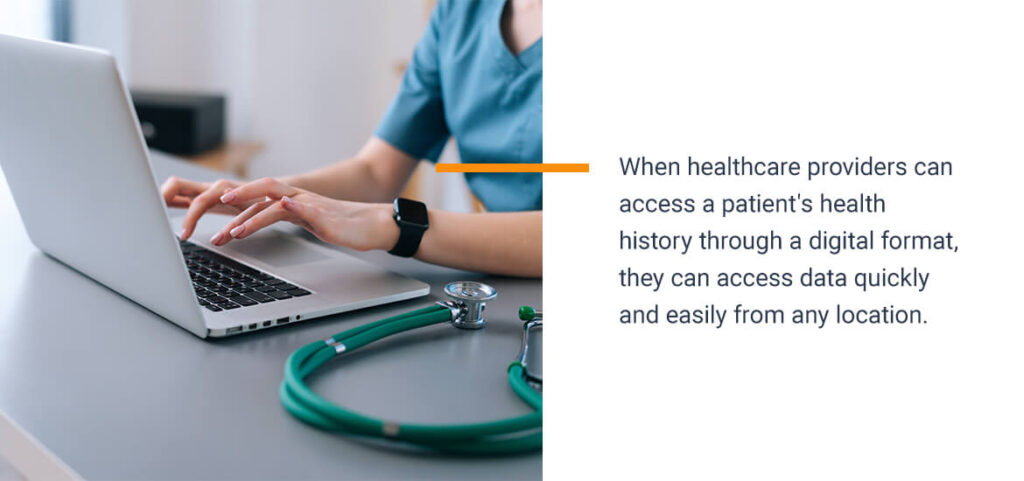Healthcare providers handle and exchange a massive amount of documents every day. Automating manual and paper-based processes can reduce inefficiencies that slow down productivity, decrease costs, and improve the patient experience.
Relying more on automation helps healthcare providers provide better patient care and increase patient engagement. Automation also enhances daily operations within a healthcare facility and improves efficiency. When your healthcare practice recognizes the crucial role of automation in healthcare, you can make more informed plans for increasing your efficiency.
Challenges with Paper-based Record Keeping in Healthcare
Keeping paper healthcare records is costly and often inefficient for practices to sustain. Manual documentation can create challenges in communicating a patient’s health information, improving a practice’s productivity, and complying with confidentiality requirements. Read on about these challenges:
High Operation Costs
Although many healthcare facilities already have paper-based record-keeping systems in place, switching to automation provides cost savings in several areas, including:
- Documentation storage: Hospitals and other practices with a large number of patients may need to store paper documents off-site in a location that protects the documents’ quality and security.
- Paper and printing: Printing documents and buying paper and copy supplies can add up to a considerable cost.
- Increased labor costs: Manual paper processes require employees to create, distribute, copy, and retrieve documents. If a practice is small enough to store files on-site, they also need someone to organize the information.
Inefficiency
Manual documentation is famously inefficient from beginning to end. Healthcare professionals spend significant time charting patient data, and writing this information by hand is time-consuming. After paper health records are created, filing and retrieving them is tedious and takes time from more practical tasks.
Paper-based record keeping also offers no integrations with other electronic business systems at the facility. Office workers and other employees must physically gather paper documents when filing a claim or performing other tasks. Automation enables integration with other systems, speeding up processes like billing.
Miscommunication During Patient Treatment and Screenings
Swift, efficient communication is vital for providing adequate patient care and facility productivity. Manual record-keeping causes miscommunication about a patient’s tests and screenings and may lead to lost or damaged health records. Medical decisions without all the information can be disastrous, but waiting to receive vital information can also be problematic.
Paper-based record-keeping also creates discrepancies between multiple healthcare facilities and providers. Patients may have physical health records at various healthcare facilities. When a provider only has access to a portion of the patient’s medical records, communication takes longer and can lead to delayed patient care.
File Clarity and Legibility
Handwritten patient records can be challenging for someone else who needs to read the file to decipher. Physicians and nurses have a large amount of patient information to write down quickly and accurately, making legibility less of a priority. When healthcare professionals chart data or record other information by hand, documents can quickly become illegible.
Paper-based documentation also involves variations in file format, abbreviations, and terminology. Working around differences like these, on top of untidy handwriting or cramped paper documents, can make it difficult for staff members to read documents.
HIPAA Compliance and Security Risks
Compliance is a significant consideration for any healthcare facility handling confidential patient records. The Health Insurance Portability and Accountability Act of 1996 (HIPAA) protects patients’ health information from being disclosed without their knowledge and consent. Healthcare providers have a responsibility to manage health records in a way that protects patient privacy.
Paper documentation poses a greater compliance risk than automated systems because of its physical nature. Paper files containing protected health information can be lost or stolen, violating HIPAA. The healthcare facility could be liable for not taking adequate security measures to protect the data.
Paper Automation and Its Crucial Role in Healthcare
Many healthcare facilities have replaced paper documentation processes with electronic health records (EHR) systems and have seen great results. EHR systems use automation and artificial intelligence to create, store, and organize patient records in digital form. Artificial intelligence in healthcare enables providers to improve efficiency and reduce mistakes while saving money.
Implementing an EHR system provides several valuable benefits, including:
Greater Efficiency
Automation helps healthcare providers unlock greater operational efficiency in several ways:
- Streamlining workflows: Paper automation places all the records for a healthcare facility’s patients within the same electronic EHR system, making them easily accessible. When staff members can access the information they need from a single digital source with a few keystrokes, they eliminate unnecessary steps and simplify their workflows.
- Managing bills and payments: Digital payment management tools integrate with a facility’s already-in-use systems. This allows administrative staff to spend less time on billing paperwork.
- Reducing inefficient manual processes: An EHR system eliminates the need for physical document creation and storage, reducing the staff’s administrative burden.
Reduces Error
A significant advantage of EHR systems is their ability to reduce errors in documentation. Electronic record-keeping eliminates the need for staff to take handwritten notes, making it easier for others to read quickly-written, potentially untidy notes. Some EHR systems enable voice-to-text, giving healthcare professionals even more options for recording their patient’s health information. Paper automation also allows the standardization of health records, streamlining the documentation process.
Another way paper automation reduces error is through improved compliance and security measures. EHR systems secure confidential patient information through user access settings and ensure only staff members with permission can access patient data, helping prevent data breaches.
Cost Savings
Digital medical record-keeping and automation can significantly cut costs for any healthcare facility. One area of cost savings is the decreased reliance on paper systems. Once a healthcare facility moves its patients’ files to an electronic, automated system, it reduces or eliminates its paper documentation.
Automation also saves providers time, which equates to cost savings over time. An EHR system frees staff and providers to focus on more valuable tasks than manually filing and transporting documents, and automation enables healthcare providers to accomplish more throughout their days.

Provides Accurate, Up-to-date Information
Because automation reduces errors in charts, files, and other essential documents, improving patient care. A healthcare practice can use automation to access the most current patient information. A patient’s records are stored in the EHR system and retrievable through a simple search.
When healthcare providers can access a patient’s health history through a digital format, they can access data quickly and easily from any location. Automation enables providers to make informed decisions about patient care more quickly.
Better Coordination of Care
Open, effective communication is critical in healthcare settings. When patients require care, healthcare providers need all the information at their fingertips as quickly as possible. While manual record-keeping can cause delays, automation enables providers to locate patient health records quickly to better coordinate care. Providers can diagnose patients more rapidly and personalize their care with fewer errors.
EHR systems also improve the patient experience. Providing improved preventative care through a more coordinated approach enables healthcare providers to reduce delays in care. An EHR system also allows providers to securely share patient health records with patients to improve the patient and provider relationship.

Get Paid Quickly, Easily and Safely with Practice Management Bridge
Giving your patients the best care possible is your healthcare facility’s top priority. Switching from paper-based documentation processes to electronic health records provides healthcare providers with modern tools for efficiency. Automation saves time and reduces costs so providers can focus on offering the care they need.
At Rectangle Health, we have been developing innovative payment technology for the healthcare industry for nearly 30 years. Our Practice Management Bridge® is a comprehensive work and cash flow solution that interfaces with your existing EHR system. Practice Management Bridge enables seamless payment options and tracking. Practice Management Bridge also offers patient financing solutions like Care Now, Pay Later (CNPL®) to make care more affordable for patients at no risk to your practice.
Rectangle Health technology solutions enable practices to focus on care even through operational disruptions. To learn more about how Practice Management Bridge and our other healthcare technology solutions can enhance your healthcare practice, schedule a demo today.



